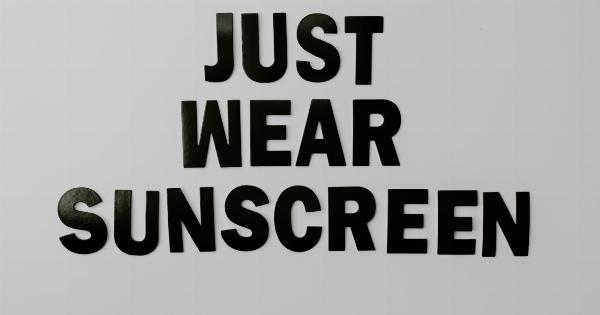Using sunscreen is an essential step for protecting our skin from the harmful effects of the sun’s ultraviolet (UV) rays. However, it’s crucial to ensure that the sunscreen you are using is not expired.
Many people are unaware of the potential risks associated with using expired sunscreen, which is why understanding the consequences is vital. In this article, we will explore what happens when you use expired sunscreen and the potential dangers it poses to your skin health.
Understanding sunscreen expiration dates
When you purchase sunscreen, you will notice that there is an expiration date mentioned on the packaging or bottle. This date indicates the period during which the product remains effective and safe for use.
The expiration date is determined based on various factors such as the formulation, active ingredients, storage conditions, and packaging.
Decreased effectiveness in protection
One of the primary concerns with using expired sunscreen is its reduced effectiveness in protecting your skin from UV rays.
The active ingredients in sunscreen, such as zinc oxide or titanium dioxide, can break down over time, rendering the product less potent. This means that the sunscreen may not provide the level of protection stated on the packaging, leaving your skin vulnerable to harmful UV radiation.
Increased risk of sunburn
Using expired sunscreen significantly increases the risk of sunburn. When your skin is exposed to the sun without proper protection, the UV rays penetrate the skin’s surface, leading to inflammation and damage.
Sunburn not only causes discomfort but also increases the risk of long-term skin damage and the development of skin cancers, including melanoma.
Unstable chemical composition
Over time, sunscreen can undergo chemical changes due to exposure to light, heat, and air. These changes alter the structure and composition of the active ingredients, making them less effective.
The sunscreen’s texture may also become clumpy or separated, making it challenging to apply evenly on the skin. This instability in the chemical composition of expired sunscreen compromises its ability to form a protective barrier on the skin’s surface.
Breakouts and skin allergies
Expired sunscreen can cause breakouts and skin allergies in some individuals. As the product deteriorates, it may harbor bacteria or fungi that can trigger skin reactions.
Additionally, the chemical breakdown of the active ingredients can lead to the formation of irritating substances, causing redness, itching, and rashes on the skin.
Reduced protection against premature aging
Using expired sunscreen may also lead to a decreased defense against premature aging signs. UV radiation is one of the main contributors to skin aging, causing wrinkles, fine lines, and age spots.
By applying expired sunscreen, you may not be providing adequate protection against these damaging rays, resulting in accelerated signs of aging.
Increased risk of skin cancer
When expired sunscreen fails to offer the required protection, your skin becomes more susceptible to the development of skin cancer.
Prolonged exposure to UV rays without proper sun protection significantly increases the risk of skin cell mutations that can eventually lead to various forms of skin cancer. It is crucial to remember that skin cancers may take years to develop, so consistently using fresh sunscreen is crucial in reducing the risk.
Loss of SPF stability
Expired sunscreen typically loses its stability in terms of its Sun Protection Factor (SPF). SPF indicates the product’s ability to protect against UVB radiation, which is responsible for causing sunburn.
As sunscreen ages, its ability to block UVB rays diminishes, which can result in inadequate sunburn protection. This is why it is essential to check the expiration date and ensure you are using sunscreen with a currently labeled SPF rating.
Less effective UVA protection
Along with protection against UVB rays, sunscreen should also shield the skin from UVA radiation. UVA rays penetrate deeper into the skin and contribute to premature aging and skin cancer development.
Expired sunscreen may offer reduced UVA protection due to the breakdown of active ingredients specifically formulated for blocking UVA rays. Using fresh sunscreen is key to ensuring complete UVA and UVB protection.
Proper storage and sunscreen lifespan
To maximize the lifespan and effectiveness of your sunscreen, it is important to store it correctly. Sunscreen should be kept in a cool, dry place, away from direct sunlight.
Exposure to high temperatures can accelerate the breakdown of the active ingredients. It’s also advisable to avoid keeping sunscreen in your car or any other place where it is subjected to extreme heat fluctuations.
Most sunscreens have a shelf life of around 2-3 years.
However, it’s essential to note that if the product has been exposed to extreme conditions or its texture, smell, or color has changed, it is best to discard it, regardless of the expiration date mentioned.
Conclusion
Using expired sunscreen can have detrimental effects on your skin health and overall sun protection. It is crucial to check the expiration date before using any sunscreen and dispose of it appropriately once it has expired.
By using fresh sunscreen and following proper storage guidelines, you can ensure optimal protection against harmful UV radiation and maintain healthy skin.





























